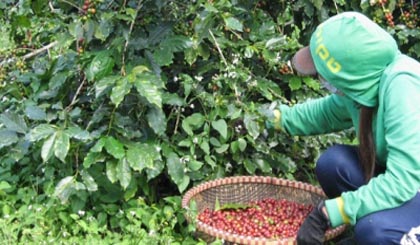Opportunities to expand export markets for agricultural products
Despite the reduction of agricultural exports since the beginning of this year, Vietnam’s agricultural products have made breakthroughs entering leading markets and supply chains in the world.
 |
| Arabica coffee in Cau Dat district, Da Lat city, Lam Dong province |
The coffee industry has seen the sharpest decline in the export revenue, both in volume (33.9%) and values (33.7%), meanwhile its prices on the futures exchanges and in the domestic market remain at a low.
However, in the last week of July, the official website of Starbucks, an internationally well-known coffee supply chain, announced that the Arabica coffee in Cau Dat district, Da Lat city, Lam Dong province in Vietnam had been selected as one of seven kinds of Arabica coffee to be displayed and sold at its 21,500 stores in 56 countries around the world.
In order to be served in Starbucks’ stores, Vietnam’s coffee met rigorous standards called ‘Starbucks C.A.F.E Practices’. In addition to Vietnam, Starbucks selected six other countries as suppliers of Arabica coffee including Indonesia, Kenya, Ruanda, Brazil, Colombia and Guatemala.
Additionally, in May and June, Vietnam’s fresh fruits, especially lychee, successfully entered the most difficult and stringent markets, including the United States, Australia and Canada. Japan has also become a big exports market for Vietnamese mangoes.
Exporting to big foreign markets will surely not only bring high profits to enterprises but also create a stepping stone for Vietnamese agricultural products to open up to new markets.
It was not easy for Vietnam’s coffee to be selected by Starbucks, or lychee and mangoes to enter difficult markets. It took 12 years for Vietnam to bargain and negotiate with Australian authorities to export lychee to this market.
Furthermore, Vietnam still faces challenges to keep these markets, particularly the competition of other potential countries in the region.
In order to enter and keep potential and difficult markets, it is necessary for Vietnam enterprises to fully adhere to rules of hygiene and quarantine of import countries, especially pesticide and antibiotics residues.
If their products have high pesticide and chemical residues, they will be destroyed at the gates of the host country and the credibility of the enterprises will decline.
It must be said that, just being exported to markets with high demand and facing many major challenges, Vietnamese products, particularly agricultural products, can create a strong foothold in the international market, elevating Vietnamese brands.
(Source: nhandan.org.vn)
.
 về đầu trang
về đầu trang







